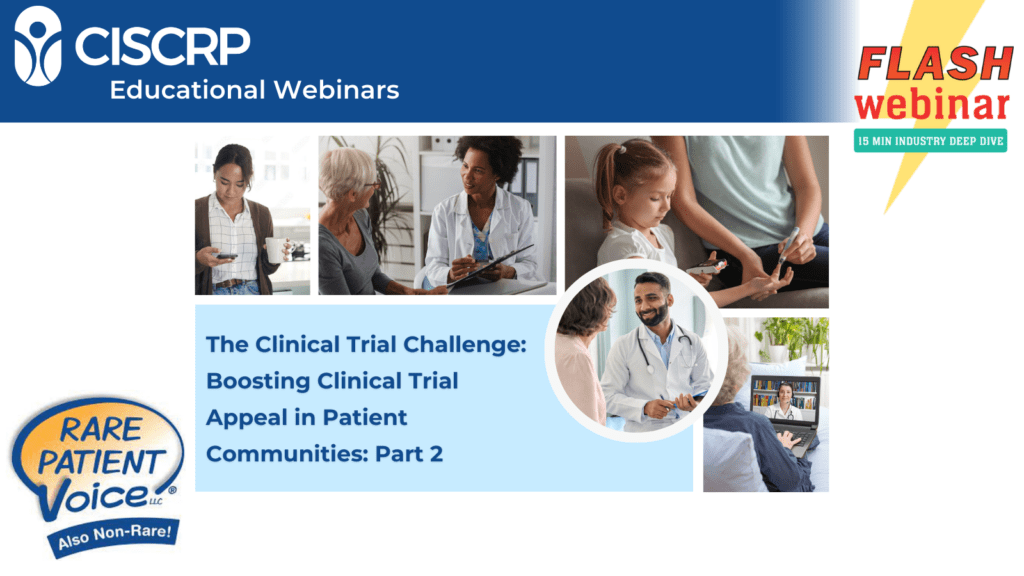Boosting Clinical Trial Appeal in Patient Communities Part 2: Rare Patient Voice FLASH Webinar Overview
By CISCRP Staff|Dec 3, 2021
By CISCRP Staff|Dec 3, 2021

Clinical research is critical to progress towards new treatments and cures for all diseases. However, engaging patients in clinical trial participation is often an uphill battle. In September, Rare Patient Voice (RPV) surveyed 1,989 patients and caregivers in the U.S. about their preferences regarding clinical trials. This 15-minute Flash Webinar, the second in a two-part series, was led by Rare Patient Voice President Wes Michael, and Amy Gietzen, a Scleroderma patient advocate, columnist, and public speaker. They shared and discussed highlights from the RPV survey results, including what factors may help encourage patient participation in trials.
In part one of this series, preferences regarding location, compensation, and reimbursement were discussed by Pam Cusick and Grace Charrier.
Another factor highlighted as important by patients when considering enrollment in a clinical trial was communication.
Wes noted, “For patients enrolling in a clinical trial, this can often be the start of a long-term commitment and a long-term relationship they build with their research team. The key to a successful relationship is communication.”
When surveyed, 96% of patients said that receiving information on the goals of the trial prior to beginning was moderately to extremely appealing.
“We’re always looking to understand what’s going on with our bodies and what treatments are best for us,” Amy shared. In her own trial experience, Amy found that information about the study was not accessible to patients and was not easy to understand once received. Often, the documents that patients do receive about their treatment contain complex medical terminology, which can prevent them from fully understanding the scope and commitment of the study they’ve signed up for. For a better trial experience, patients are looking for clear communication regarding the goal of the study, how their participation plays a part in this, and what their participation will involve.
Additionally, 96% of patients also said that they found receiving results after trial completion important.
Beyond the need for research teams to disseminate study information to participants, there is a second important aspect to improving patient communication: health literacy. Receiving information about their study is only beneficial if patients can easily understand the information. “I think a key part of improving patients’ understanding of clinical trial results is including patients in the process of creating the educational materials that share findings,” Amy explained. “In the beginning when I was diagnosed with Scleroderma, I couldn’t understand any of the information shared with me for clinical trials. Over the years, I’ve learned the language and what to look for. However, communication like this needs to be accessible to all patients, whether you’re two years into your diagnosis or twenty.”
Wes shared his agreement with Amy, citing the growing trend in the healthcare industry among pharmaceutical companies who are working on creating trials and bringing patients into the process. “It’s important to have their feedback regarding what they would like to see, what would be helpful, and how their needs can be met,” Wes said.
Within her own network of patient advocates, Amy has found that the more researchers can help patients understand a study’s goal and what this process involves, the more likely patients are to share their positive clinical trial experiences with other people and encourage their community to participate.
Patients also shared feedback regarding improvements in communication they thought could be beneficial during clinical trial participation, Some responses included:
Inevitably, side effects and concerns from medications don’t stay within a 9-5-time range. “I have never experienced 24/7 contact availability with my own clinical trial participation, but I think that’s a great idea,” Amy said. “For many patients, this experience is so new. Having someone available to answer your questions or discuss your symptoms would be great.”
Ultimately, no one wants to feel alone during their clinical trial experience. To increase the appeal of participation, researchers should make transparency and clear communication with patients a top priority.
To join Rare Patient Voice to take part in research studies, sign up here.